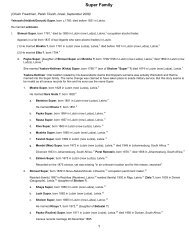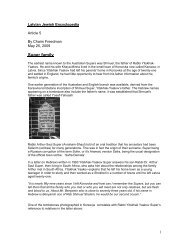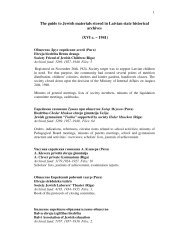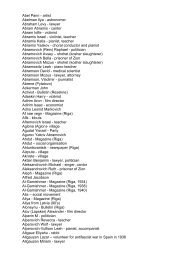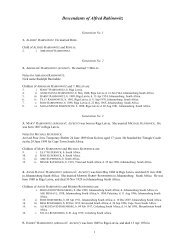Small Riga Ghetto
Small Riga Ghetto
Small Riga Ghetto
You also want an ePaper? Increase the reach of your titles
YUMPU automatically turns print PDFs into web optimized ePapers that Google loves.
238<br />
Now the call rang out: "Skilled craftsmen! Mechanics, shoemakers, tailors and<br />
others!" Those who volunteered had to run to the table as fast as they could. It<br />
was immediately obvious who could run fast and who couldn't. Those who<br />
couldn't were told to go off to the side. Now each of us tried, with his last<br />
ounce of strength, to pass this test. Even cripples tried it, but they were sent<br />
back immediately.<br />
This selection process for the work crew lasted three days. It was a rest period<br />
for us, because (1) we didn't have to work, and (2) we were safe from<br />
beatings. In the meantime we found out that the selected workers would be<br />
taken to Magdeburg. I had tried by every possible means to be one of them.<br />
My efforts were successful. I thought to myself: winter's coming on, and<br />
they'll certainly put us to work in closed rooms inside that factory. My supposition<br />
was correct.<br />
IX.<br />
The lists of workers were drawn up quickly. Now we had to wait for the<br />
trucks into which we would be loaded. Three hundred women, mostly from<br />
Vilno and Hungary, and a single small Latvian boy, Sima, were also in our<br />
transport. Because the planned departure could take place any day and any<br />
hour, we were not sent to do any work for the time being. After several weeks<br />
had passed in this way, the Labor Authority decided that our idleness had<br />
lasted too long and that we would be sent to work again. In the meantime two<br />
other Jewish transports, of women and men, departed. One was headed by a<br />
certain Glücksmann and the other by the notorious Kassel. These people<br />
worked near Danzig under extremely difficult conditions (see the chapter "Via<br />
Stutthof - Burggraben... - Lauenburg to Freedom"). Only a few of them survived,<br />
and many died of starvation, the cold and the beatings.<br />
After the first transport had gone, there was somewhat more space in our<br />
barrack. Now once again we went to work regularly. A work crew that drove<br />
to Elbing every day had fairly good conditions there. The ABA also set up<br />
work stations and employed many of our people, for example the engineer Antikol,<br />
Springenfeld * and others. Unfortunately, none of them survived.<br />
There was a new work crew, the so-called "potato commando". Cars loaded<br />
with potatoes would arrive on our narrow-gauge railroad. They had to be<br />
unloaded and clamped. The work in itself would not have been difficult, if<br />
only the many Polish overseers had not beaten us constantly with large trun-<br />
* [Ed.: Springenfeld survived, but by then Kaufmann's book had already been printed.]



